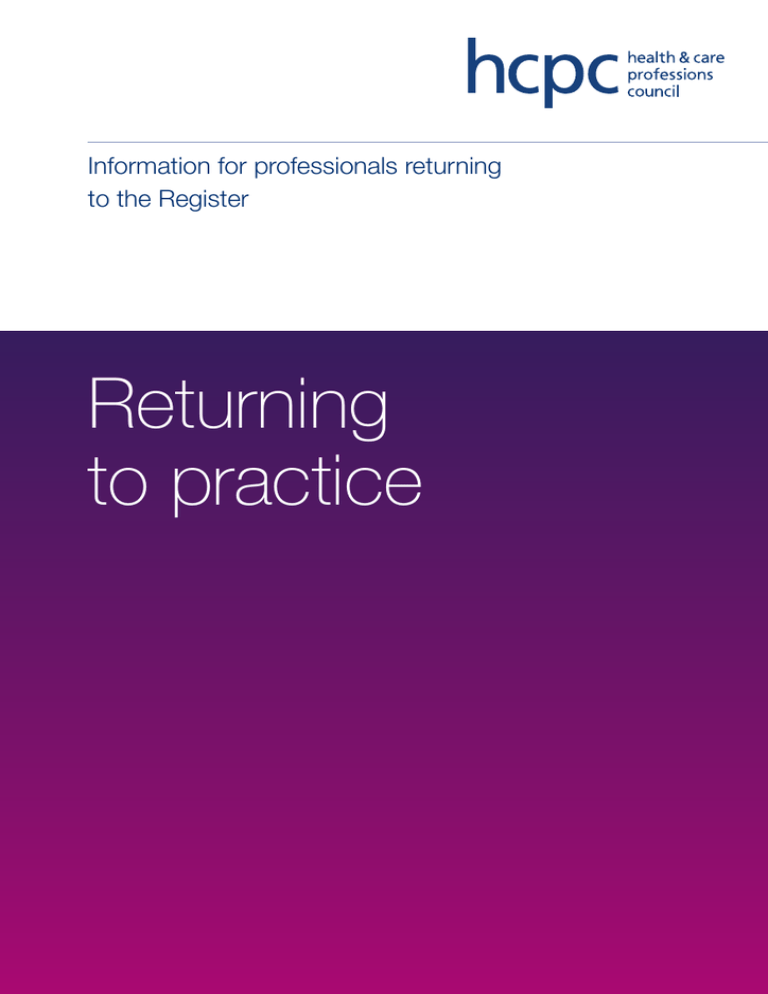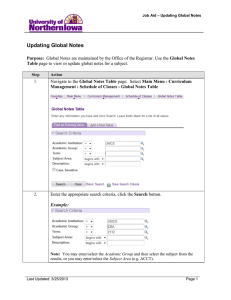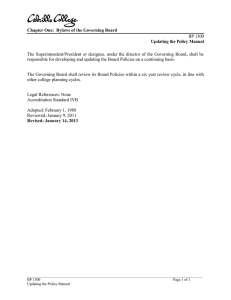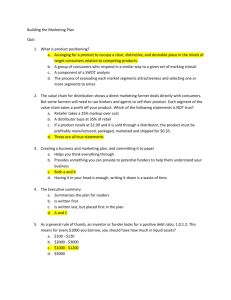Returning to practice - Health and Care Professions Council
advertisement

Information for professionals returning to the Register Returning to practice Contents About this document 1 About us 1 Returning to practice 2 Our requirements for returners 2 If you have never been registered with us before 3 Period of updating 3 The activities which make up your period of updating 4 Structuring your period of updating 6 Checking the information you provide 7 Your responsibility 8 Minimum requirements 8 The role of the employer 8 If you are out of practice, but still registered with us 9 Defining ‘practising your profession’ 11 Practising outside the UK 12 More information 12 Returning to practice About this document This brochure has been written for professionals who have taken a break from practising and wish to start practising again. Throughout this document, ‘we’ refers to the Health and Care Professions Council, and ‘you’ refers to a professional who is not practising. Most of the brochure is for professionals who are not registered, and who need to apply for readmission to the Register. However, you may also find this brochure helpful if you are registered with us but have not been practising, if you are considering a break in your practice, and thinking about what this might mean in the future, or if you are considering supervising or employing a returner to practice. About us We are the Health and Care Professions Council. We were created to protect the public. To do this, we keep a register of professionals who meet our standards for their training, professional skills, behaviour and health. We currently register the following professions. – Arts therapists – Biomedical scientists – Chiropodists / podiatrists – Clinical scientists – Dietitians – Hearing aid dispensers – Occupational therapists – Operating department practitioners – Orthoptists – Paramedics – Physiotherapists – Practitioner psychologists Returning to practice 1 – Prosthetists / orthotists – Radiographers – Social workers in England – Speech and language therapists All of the professions have at least one professional title which is protected by law, including those shown above. This means, for example, that anyone using the titles ‘physiotherapist’ or ‘dietitian’ must be registered with us. It is a criminal offence for someone to claim that they are registered with us when they are not, or to use a protected title that they are not entitled to use. We will prosecute people who commit these crimes. Returning to practice During the course of their career, many professionals may not practise their profession for a period of time. This may occur for many reasons, which could include parental leave, extended travel, caring responsibilities or illness. We know that these professionals may wish to come back to their profession and resume their practice, which is why we have established this process. Our return to practice requirements apply to anyone who has not practised their profession for more than two years. This is the case whether you are unregistered and want to apply for readmission, or whether you are still on the Register but not practising. This means that if you are still registered with us, but are not practising your profession, you should read this leaflet in order to find out more about your options for registration. Our requirements for returners 0 – 2 years out of practice – no requirements 2 – 5 years out of practice – 30 days of updating 5 years or more out of practice – 60 days of updating 2 Returning to practice If you take a break in your practice of less than two years, you can begin practising again without having to meet any additional requirements set by us. We believe that this is flexible enough to accommodate registrants who take a short break from practice (and particularly for registrants who take leave to start a family) without compromising public protection and our role in upholding standards. If you have never been registered with us before If you have never been registered with us and have a qualification that was gained more than five years ago, the Health and Social Work Professions Order 2001 (the legislation that created us) says that we can require you to update your knowledge and skills. We have decided only to ask you to update if you have been out of practice. This means that if you qualified in the UK, then moved overseas and have been practising outside the UK, you can give us information about where you have been practising, and you do not have to update. However, if you took your approved programme more than five years ago, and you have been out of practice for more than two years, then our return to practice requirements also apply to you. Period of updating Your period of updating knowledge and skills can be made up of any combination of supervised practice, formal study or private study. Our only requirement is that any private study makes up a maximum of half the period. For example, if you needed to do 30 days of updating, you could do this by completing: – 30 days of supervised practice; – 10 days of supervised practice, 10 days of private study, and 10 days of formal study; or – 15 days of private study, and 15 days of formal study. This is not an exhaustive list. The above are just examples to show how our requirements are flexible enough to accommodate your requirements. Returning to practice 3 The activities which make up your period of updating Supervised practice ‘Supervised practice’ is practising under the supervision of a registered professional. During a period of supervised practice, you may have the option of being employed as an assistant in your profession, but you do not have to. In order to complete a period of supervised practice, you will need to identify a supervisor. Your supervisor must: – be on the relevant part of the HCPC Register; – have been in regulated practice for at least the previous three years; and – not be subject to any fitness to practise proceedings or orders, ie they must not be cautioned, or subject to ‘conditions of practice’. We do not set detailed requirements regarding the level of supervision needed, or the tasks that you need to undertake. We believe that this is best negotiated directly between you and your supervisor, on the basis of your learning needs. We do require that your supervisor should only supervise those activities which are within their own scope of practice. This is so that your supervisor can provide relevant input and guidance, and also to ensure that both you and your supervisor are practising safely and effectively. This means that your period of supervised practice could be undertaken, for example, in teaching, management, or research, or wherever your supervisor practises their profession. Formal study ‘Formal study’ is a period of structured study which is provided by a person or organisation. This can include distance learning or e-learning, or any other type of course or programme that is relevant to your practice. 4 Returning to practice Types of formal study that you might choose to take could include: – ‘return to practice’ programmes run by educational institutions or other bodies; – relevant ‘continuing professional development’ courses; – relevant modules or elements currently included in programmes run by educational institutions; or – programmes offered by professional bodies. We do not approve return to practice courses, because we believe that you are best-placed to determine which courses are most appropriate, and which types of formal study will best update your skills and knowledge so that you can re-enter practice safely. Private study ‘Private study’ is a period of study which you structure yourself. If you choose to use private study as part of your updating, you could use resources including: – websites; – library books; and – journals. You may find private study a particularly useful option if you plan to return to a field which is extremely specialised, where there may be limited opportunities for formal study or supervised practice. It may also prove useful if you live in an area where it is difficult to gain a period of supervised practice, or if you need to fit your updating period around other demands on your time, such as another job, or caring responsibilities. However, you should be aware that private study can only make up a maximum of half of your total period (eg 15 of your 30 days’ updating, or 30 of your 60 days’ updating). Returning to practice 5 Structuring your period of updating We know that the updating you need to complete will be individual to you. The areas of your profession that you need to update will depend on: – the area in which you intend to work when you begin practising again; – your prior experience; – any relevant skills you gained whilst out of practice; and – any relevant developments in your profession during the time when you were out of practice. In requiring a certain number of ‘updating days’, we are providing an outline which allows you to structure your period of updating in the way which best reflects your needs. You may find it helpful to contact your professional body, who may be able to provide you with information about how to update, or guidance on how you could structure your updating period. You may also find it useful to use our standards of proficiency as a basis for thinking about which areas you could concentrate on. You do not have to do your period of updating full-time; you can complete it part-time if you wish. For the purposes of completing your forms, we regard one day as being equivalent to seven hours. You do not have to complete your entire period of updating at once. You can carry out part of your period of updating, then have a break, then come back and complete the rest. Our only requirement for the timescale is that all of your updating should be completed within the twelve months before you apply for registration. We believe that this strikes a balance between operating a flexible system, which recognises that returners are more likely to have family and caring commitments, and recognising that if updating is undertaken over a very extended period of time, then the opportunities for development are limited. 6 Returning to practice Checking the information you provide Forms We provide forms on which you can give us information about your period of updating, such as which activities you have undertaken and for how long. These forms are available on our website, or from the Registration Department, whose contact details are at the back of this brochure. You may find it helpful to go online and download these forms and the guidance notes before you begin your period of updating. Your counter-signatory When you have completed your period of updating, you need to ask someone from your part of the Register to counter-sign your form, to confirm that you have undertaken the period. The person who signs this does not need to physically supervise every day of your updating, and they do not need to confirm that you are fit to practise. They just need to take reasonable steps to be sure that you have undertaken the number of days required. For example, they might ask to see a certificate from any formal study, or they might ask to see any notes from your private study. Processing your information We will check the information you send us to see that you have completed the required number of days. We may contact you or the organisations / individuals that you work for to get more information, or to check the information that you have provided. For example, we will look at our Register to check that your supervisor is registered with us and does not have any fitness to practise action against them. We may also contact the organisation that provided your formal study, to check that they have a record of your attendance and completion of the course. Returning to practice 7 Your responsibility As a returner to practice, you are responsible for your own period of updating, and for ensuring that you meet our standards before you return to practice. We will ask you for information so that we can check that your updating period took place, but you are responsible for the learning that you undertake, and for making a personal professional decision as to whether this updating is adequate to allow you to practise safely and effectively. We believe that most professionals will take this responsibility seriously, and will undertake their updating in good faith. However, if after you have re-registered with us, we find that you are not practising in a way that meets our standards, we could take action against you using our fitness to practise process. Similarly, if we find that the information you have supplied is not accurate, we could take action that could include removing you from the Register. Minimum requirements All professionals, once registered with us, have to ensure that they meet our standards. This includes meeting our standards of conduct, performance and ethics, which require that you practise within your scope of practice. This applies to everyone registered with us, whether returning to practice or not. The amount of updating that we require is a minimum requirement in order to become re-registered. This means that you can complete additional updating if you need to, before you are confident that you can meet our standards. The role of the employer It is also important to stress the role of an employer. Our requirements do not replace the responsibilities of an employer in appointing, inducting, and supporting members of staff. Any employer who wants to employ a registrant will need to set their own requirements in terms of knowledge, skills, qualifications and experience for any particular post, and will assess applicants for a post in order to ensure that a suitable appointment is made. 8 Returning to practice We expect that an induction process would follow, and, for a returner in particular, that the employer would want to put in place a process of support for that person while they become familiar with practice again. This could include mentoring and / or review and additional support mechanisms. Equally, an employer may have a specific requirement for a certain profession, or for your role, that you should update in a certain area, in a certain way, or regarding a certain issue, before you can work for them. Our requirements do not replace these processes, but any requirements we have can sit alongside them. We realise that not all registrants have employers, and some are in fact self-employed; this is why we set our own requirements, rather than rely entirely on local induction or support methods. You might identify a potential employer, and undertake your updating period as part of your induction with them. Equally, you might complete your updating period, then become registered, then begin to look for a job. Our requirements mean that you can choose to update and look for work in whatever order is most convenient for you, most acceptable to your employer, or usual for your profession. If you are out of practice, but still registered with us In the past, we have not required professionals to continue practising in order to renew registration. This section of the document is therefore written for the small number of professionals who are still registered with us, but who are no longer practising their profession, and have been out of practice for more than two years. If you are still registered with us, the requirement for you to undertake a period of updating is linked to your registration renewal. In addition to this, you still have an overarching responsibility to make sure that, if you return to practice, you only practise safely and effectively within your scope of practice. Returning to practice 9 In order to renew your registration with us every two years, you need to sign to confirm that you are practising your profession. In effect, this means that you need to sign to confirm to us that you have practised your profession at some point during the two-year registration cycle which is coming to an end. If you have not practised your profession during this period, then you have a choice of either: – coming off the Register, and then potentially re-registering at some point in the future if you need to return to practice; or – completing a period of updating before you renew your registration. You would then complete forms describing what updating you had done, and send this to us with your renewal form and registration fee. The only exception to this is if you have come onto the Register during the two-year registration period. If you have come onto the Register, then you will have either completed an approved course, or had your application assessed, or you will have met our return to practice requirements. We therefore do not require you to complete a period of updating. If you have been out of practice, but you anticipate returning to practice soon, then we recommend that you should complete your period of updating, and renew your registration so that you stay on the Register. If you are not practising for more than two years, we recommend that you should come off the Register. Registration exists to protect professional titles, and to protect the public, and therefore you do not need to be registered if you are not practising. If you come off the Register and then ever need to re-register, you can apply to us for readmission. At this point, the return to practice requirements will apply to you, depending on how long you have been out of practice. You should also be aware that when you apply for readmission you will need to provide us with a character reference and certified documents to verify your identity. More information about applying for readmission is on our website. 10 Returning to practice Defining ‘practising your profession’ For most registrants, the question of whether they need to renew their registration is a straightforward one. Professionals must remain registered if they are using a protected title. In addition to this, they may be required to stay registered because: – they are practising their profession in the NHS or in a local authority; or – their employer requires them to be registered as part of the requirements for the job. For other registrants the question of whether they need to remain registered, or can remain registered, is not as straightforward. We have received a number of enquiries from professionals who are concerned that their practice may not ‘count’ as ‘practising their profession’. The largest number of these enquiries were from professionals working in education, management or research, which we have always assured registrants is part of practice. However, we have also received a number of enquiries from people who work on a voluntary basis, or do occasional part-time work, or who have moved into a role that is related to their profession, but not directly part of it. We do not want to exclude people from the Register who work in these kinds of roles, or people who are using their professional skills in some capacity but are worried that they will not be considered to be ‘practising their profession’ in a direct way. We also believe that in many cases the person best placed to decide whether someone is practising their profession will be the professional themselves. For the purposes of renewing registration, or determining whether return to practice requirements need to be met, we have defined ‘practising your profession’ as drawing on your professional skills and / or knowledge in the course of your work. You will need to make a personal decision about whether you are doing this. Returning to practice 11 Practising outside the UK Our return to practice requirements are for people who have not been practising their profession. If you have been practising outside the UK and have not had a break of more than two years, then our requirements will not apply to you. We will ask you to provide us with information about where you have practised, and (if applicable) your registration with another regulator while you were outside the UK. More information Information about our requirements is available on our website, or you can contact our Registration Department for further information, using the details below. Registration Department The Health and Care Professions Council Park House 184 Kennington Park Road London SE11 4BU Phone: +44 (0)845 300 4472 (Monday to Friday, 8am to 6pm) Email: registration@hcpc-uk.org 12 Returning to practice Park House 184 Kennington Park Road London SE11 4BU tel +44 (0)845 300 6184 fax +44 (0)20 7820 9684 www.hcpc-uk.org This document is available in alternative formats and Welsh on request. Call +44 (0)20 7840 9806 or email publications@hcpc-uk.org © Health and Care Professions Council 2012 Publication code: 20060503bPOLPUB (revised April 2011) (reprinted with amends due to organisational name change in August 2012) This publication is produced using trees from sustainable forests and recycled fibre.



